Milan, first half of June 1967.
- The sacrifice of the structures of the Mondo Beat Movement for the triumph of the Contestation.
In early June, a Catholic priest in civilian clothes came to pitch a tent in Barbonia City. He was not the kind of priest who contestated the Vatican, as he treated the youths with Christian benevolence. Dante Palla, who used to give nicknames to the newcomers, nicknamed him Father Spy.
Jean Cheko, a French Jew who sold rings at night in the bars of Brera, had got into the habit of arriving in Barbonia City in the morning. He was trying to understand what kind of predisposition Melchiorre Gerbino had towards Israel.
Clearly, the two were agents, Father Spy of the Vatican, Jean Cheko of the Zionists. But it was unusual for agents like them to frequent Barbonia City and the fact that they had arrived at the same time was alarming, so one could expect something exceptional to happen.
In fact, an armed conflict between Israelis and Arabs broke out on June 5.
Regarding this war, Mondo Beat could take no other position than neutrality towards the belligerents, since the Israelis were supported by the Americans, the Arabs by the Russians. To be in solidarity with one part, no matter which, would have caused the implosion of the Contestation, which was almost on the verge of spreading to the mass level. But neutrality would not have meant that Mondo Beat could stay out of the consequences of this war, since this war would have involved everyone, directly or indirectly, due to the intrigue of interests which fueled it.
Before this war, we expected that the youths of the Base of Mondo Beat would engage in triggering the mass contestation in the months of October, November, December of that year 1967, after which the Mondo Beat Movement would have been disbanded, and the reason for this programming has already been explained. But now, due to this war, which would accelerate the course of events and provoke other unpredictable ones, there was little chance that the Movement could proceed as planned.
As for Melchiorre Gerbino's personal situation, when because of this war, or for any other reason, the Mondo Beat Movement ended, Melchiorre Gerbino would have felt a sense of liberation. If the objective of mass contestation had been achieved, Melchiorre Gerbino would have felt happy, otherwise sad, but in any case liberated to return to his travels. Let's explain this. A year before the founding of the Mondo Beat Movement, Melchiorre Gerbino and Gunilla Unger were on a trip from Sicily to France, when they stopped in Milan, because they had to take a train from there. They had to wait 4 hours before getting that train and during those hours they visited Milan. They liked the city so much that Melchiorre Gerbino phoned an uncle, a brother of his mother, an industrialist who lived in Milan and Melchiorre Gerbino and Gunilla Unger would remain there. During their stay, they encountered Vittorio Di Russo, whom they had not seen since the time of their friendship in Stockholm, and from this encounter begun the history of Mondo Beat, but at the end of it Melchiorre Gerbino would return to his travels. Thus, if it is true that he would not have acted to shorten the duration of the Movement, neither would he have tried to extend it to obtain personal advantages, such as being elected to the Italian Parliament. In fact, hell had already happened between him and his father, because he didn't want to be elected to the Italian Parliament, but he wanted to travel to see the world.
Returning now to the chronological order of events, Corriere della Sera, Corriere d'informazione and La Notte had refrained from attacking Mondo Beat since the beginning of the war between Israelis and Arabs. This, because those newspapers had to study a new strategy against us, in the light of that war, but their goal would have been the same as before, the destruction of Mondo Beat. They returned to the attack, La Notte on June 8, Corriere della Sera on 9.
(La Notte, June 8, 1967) - (Corriere della Sera, June 9, 1967)
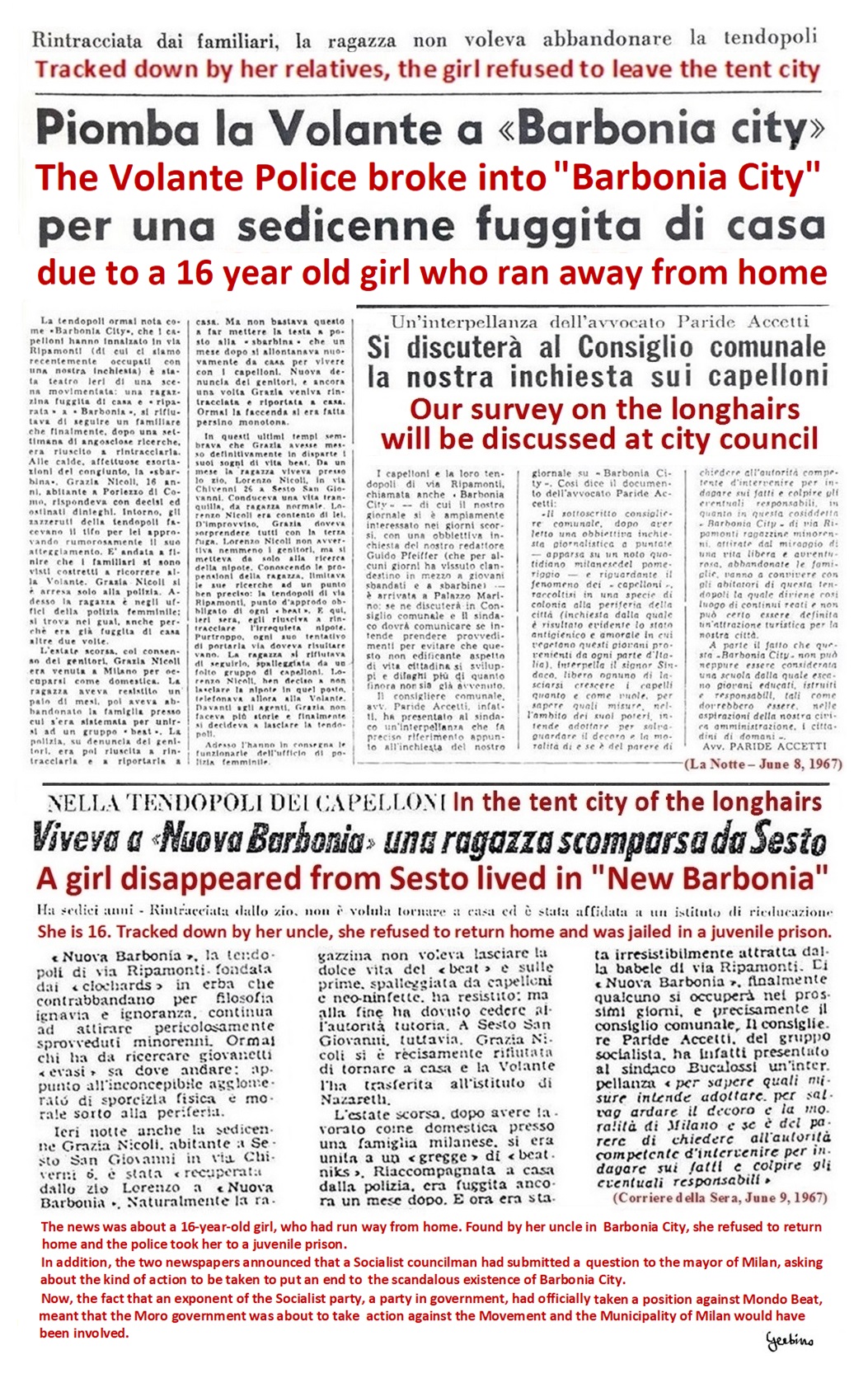
A political maneuver against Barbonia City.
The news was about a 16-year-old girl, who had run way from home. Found by her uncle in Barbonia City, she refused to return home and the police took her to a juvenile prison.
In addition, the two newspapers announced that a Socialist councilor had submitted a question to the mayor of Milan, asking about the kind of action to be taken to put an end to the scandalous existence of Barbonia City.
Now, the fact that a member of the Socialist party, a party in government, had officially taken position against Mondo Beat, meant that the Moro government was about to take action against the Movement.
Military attack on Barbonia City - Milan, June 10, 1967.
In the early afternoon of June 10, while Melchiorre Gerbino was giving an interview in his tent, gunshots were suddenly heard nearby and sirens sounded from numerous police cars. Melchiorre Gerbino came out of his tent, like his interviewer, who turned out to be a secret agent and not a journalist, because he went to the big tarp
Good people, Corriere della Sera tells you bullshit
and cut the ropes with a knife and threw the tarp to the ground.
There was pandemonium going on in the campsite. There were stout cops fighting with karate moves against athletic Beats never seen before in Barbonia City, while dozens of common cops chased boys and girls, most in bathing suits, handcuffed them and took them into vans parked outside the camp. Meanwhile, in the forecourt of the gas station, which was crowded with onlookers, there were agents of the secret services, disguised as fathers of families, who loudly encouraged the onlookers to enter the campsite and set fire to the tents, while several carabinieri were climbing the barbed wire who delimited the camp. In this chaos, Gunilla Unger, with little Nino in her arms, went to commissioner Ludovico Reale, who was in charge of the military operation, and asked him to protect the tents. Ludovico Reale, surprised by the arrival of Gunilla Unger and journalists who took photos, decided to leave her and some police officers to protect the tents, while all the campers were handcuffed and taken to the Police Headquarters.
After two hours of detention, Melchiorre Gerbino was released. The Police Headquarters declared to the press "because he said words of peace when the battle broke out in the camp", but in reality Melchiorre Gerbino was released because the Vatican and the Zionists had feared that, without his leadership, who was equidistant from the two blocs, the Mondo Beat Movement could have taken a stand in favor of the Arabs.
Back in Barbonia City, Melchiorre Gerbino found the campsite stubbornly revived, as many students had rushed there and many ordinary people who loved the Movement. But he realized how Barbonia City had suffered a deadly blow, as sixteen of its more committed characters, including Umberto Tiboni, had been arrested and incarcerated and, as a result, there was no longer an operational staff in the campsite.
At the same time as Melchiorre Gerbino, Giuseppe Pinelli also arrived at the campsite and told that many plainclothes cops were positioned near the Cave. Giuseppe Pinelli suggested collecting the material to be saved and moving it from the Cave to the Sacco and Vanzetti section. To do this operation, he would have returned to Barbonia City the next morning with a friend who had a large car. The next day was a Sunday and the Italian system relaxed on Sundays, so we had a safe day to take action.
At night, Melchiorre Gerbino reflected on what had happened.
What they had invented to justify the attack was that a mother had arrived in Barbonia City looking for her son, but had been prevented from entering the campsite. Thus, she called the police and when a police car arrived, the Beats threw stones at it. Therefore, the Police Headquarters had to mobilize more men and, because a fierce battle would have raged in the campsite, the carabinieri also had to intervene.
This was the official statement to justify the attack, but in reality the police came to arrest all the campers in Barbonia City so that the secret agents, disguised as fathers of family, who had the task of setting fire to the tents, would do it without opposition. But for the success of this plan, at least one person, who was not a secret agent, had to be arrested by the police and shown to the public by the press, so that the Police Headquarters would be able to fabricate a story of many fathers who had torched the tents and then had escaped capture. And the Corriere della Sera, Corriere d'informazione and La Notte would have pointed out that, yes, setting fire to the tents was an illegal action, but nevertheless the mood of many fathers had to be understood and justified, because many girls had been forced into prostitution in those tents and many boys forced to take drugs. But their plan failed, as none of the onlookers entered the campsite to set fire to the tents.
Now, considering another aspect, that is, the fact that more than hundred men had been mobilized to attack Barbonia City, an operation of such proportion could not have been planned without the authorization of the Moro government. Aldo Moro, who was disguised as a progressive politician, was actually a devious servant of the Vatican. He was surely ordered to destroy the structures of Mondo Beat when the war between Israelis and Arabs caused so much clamor that it would have dampened the clamor for the destruction of the tent city of Mondo Bet. It was therefore logical to foresee that the soldiers would return very soon to Barbonia City, to destroy it definitively.
As this seemed the real situation in which Mondo Beat found itself, Melchiorre Gerbino concluded that there was nothing better to do than act so that the destruction of Mondo Beat provoked a loud
and long clamor. To achieve this result, he decided to bluff. He devised an imaginative Gathering of Beats and Provos from all Italy in Barbonia City, intended as a first step to permanently occupy Milan. If in the Vatican they went hysterical at this news, they would have asked Aldo Moro to protect the city. Then, hundreds of men would have had to be mobilized to establish checkpoints at the intersections of all the roads which connected Milan with the surrounding territory, and hundreds of other men had to be ready to counterattack the invaders. If the bluff had failed, because in the Vatican they would have considered that a revolution in Italy could not be successful in the summer, Melchiorre Gerbino had nothing to lose, since the structures of Mondo Beat were in any case doomed to destruction. But if they had fallen into the trap, a military operation carried out by hundreds of men, which would have inevitably annoyed the Milanese population and exasperated young people even more, this would have accelerated the timing of mass contestation. So, Melchiorre Gerbino conceived an imaginative flyer with which he called on all Italian Beats and Provos to gather almost immediately in Barbonia City, that is from June 15. In his tent, by candlelight, he typed the leaflet several times, making copies with the carbon paper.
Copy of the leaflet and translation of it into English
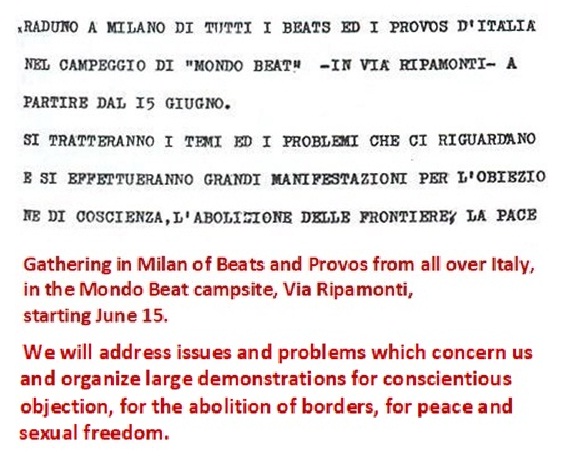
A leaflet intended to provoke hysteria in the Vatican and military intervention in Milan.
The leaflet reads: "Gathering in Milan of Beats and Provos from all over Italy, in the Mondo Beat campsite, Via Ripamonti, starting June 15. We will face issues and problems which concern us and we will organize major rallies for conscientious objection, the abolition of the borders, for peace and sexual freedom."
As you can see, Melchiorre Gerbino mentioned sexual freedom, this would have bothered the Vatican, because if people have spontaneous sexual relations, they no longer perceive the suffering of the Holy Cross, on which the business of the Holy See is based. And since the Corriere della Sera had exaggerated with descriptions of mass copulations in the open in the lawn of Barbonia City, Melchiorre Gerbino hoped that in the Vatican they would have feared a Milan invaded by Beats who would have sex on the street corners. In short, this leaflet was intended to create terror in the Vatican, that is to say, Milan occupied indefinitely by thousands of orgiastic contestators.
Milan, June 11, 1967 - The last day of Barbonia City.
That day, Barbonia City was more alive than ever. There were so many young people like never before, as many understood that Barbonia City was going to be destroyed and they wanted to show their love.
Before continuing with the reconstruction of the events, let's see what the press had published about the military attack against Barbonia City
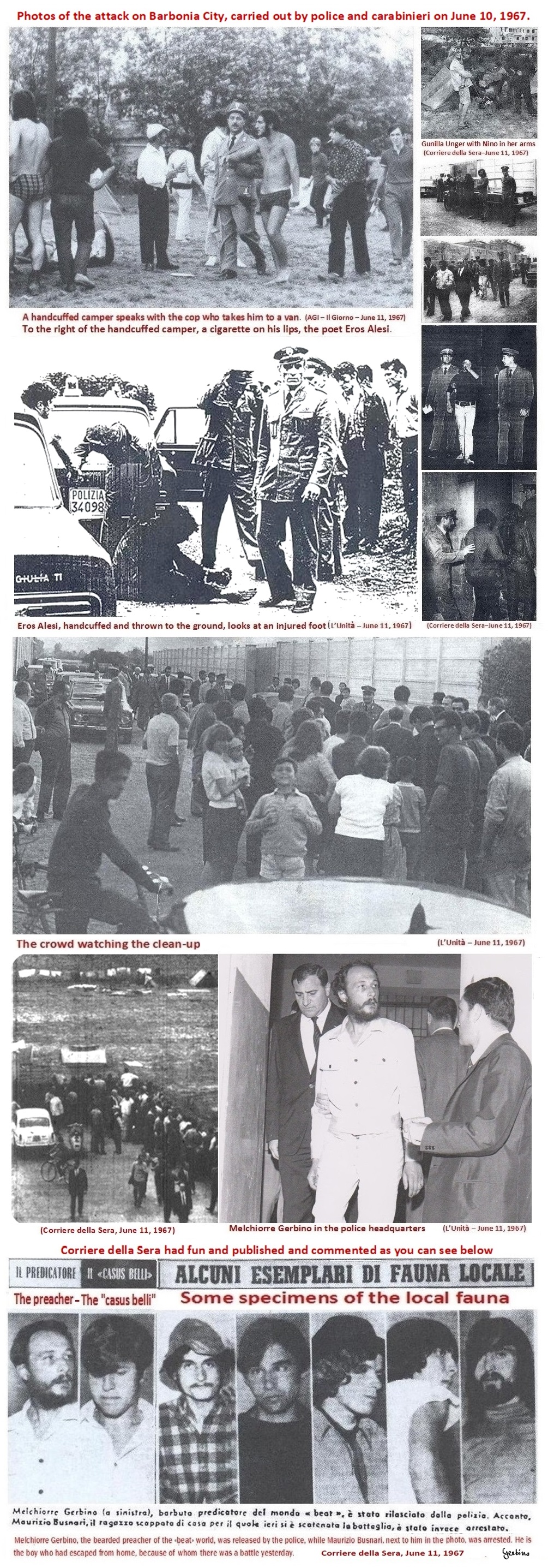
Photos of the military attack on Barbonia City.
Articles on the military attack against Barbonia City.
(Il Giorno, June 11, 1967)
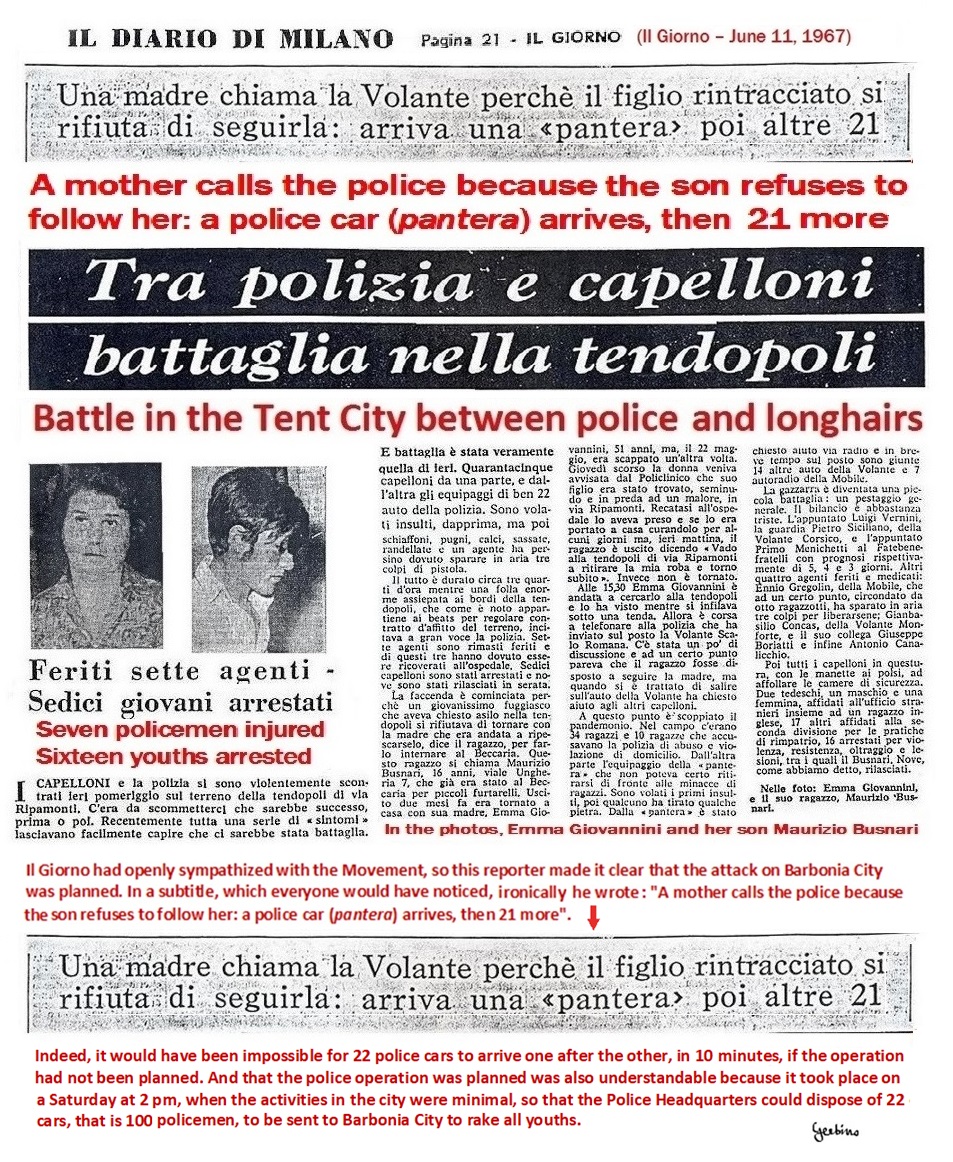
The military attack on Barbonia City described by Il Giorno.
Il Giorno had openly sympathized with the Movement, so this reporter made it clear that the attack on Barbonia City was planned. In a subtitle, which everyone would have noticed, ironically he wrote: "A mother calls the police because the son refuses to follow her: a police car (pantera) arrives, then 21 more".
Indeed, it would have been impossible for 22 police cars to arrive one after the other, in 10 minutes, if the operation had not been planned. And that the police operation was planned was also understandable because it took place on a Saturday at 2 pm, when the activities in the city were minimal, so that the Police Headquarters could dispose of 22 cars, that is 100 policemen, to be sent to Barbonia City to rake up all youths.
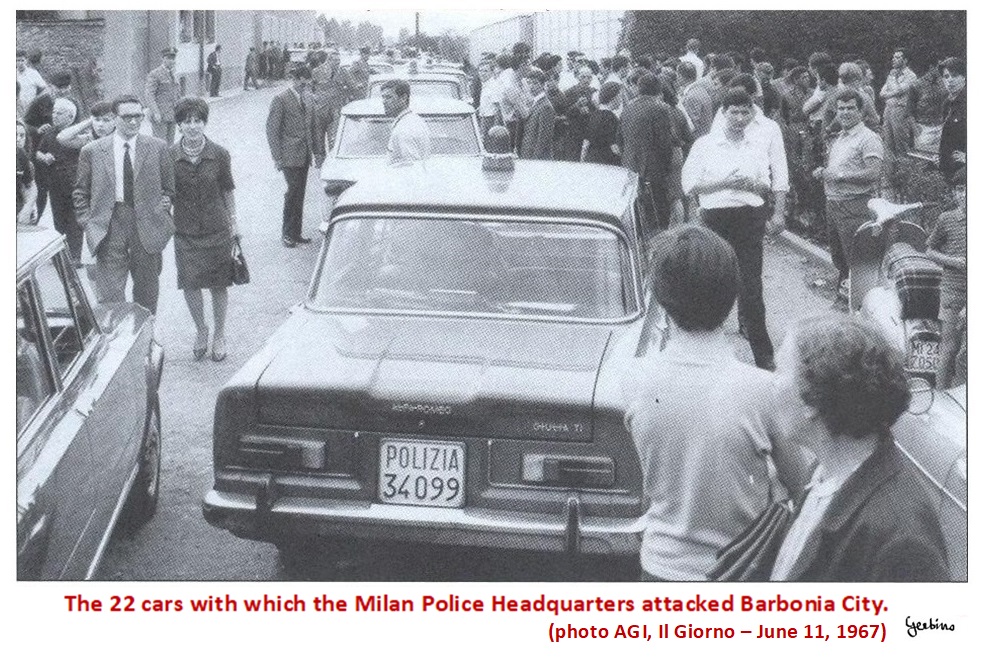
The 22 cars with which the Milan Police Headquarters attacked Barbonia City.
It should be noted that only journalists from Corriere della Sera, Corriere d'informazione and La Notte arrived at the same time as the military, as they were coordinated with the Police Headquarters, while journalists from other newspapers have arrived not during, but after the military raid, so they couldn't witness the facts. These journalists, who did not witness the facts, were informed of thugs and criminals who had engaged in a furious battle against the police for almost two hours, when in reality the peaceful youths of Mondo Beat, most of them in bathing suits, were quickly captured and handcuffed.
(L'Unità, June 11, 1967)
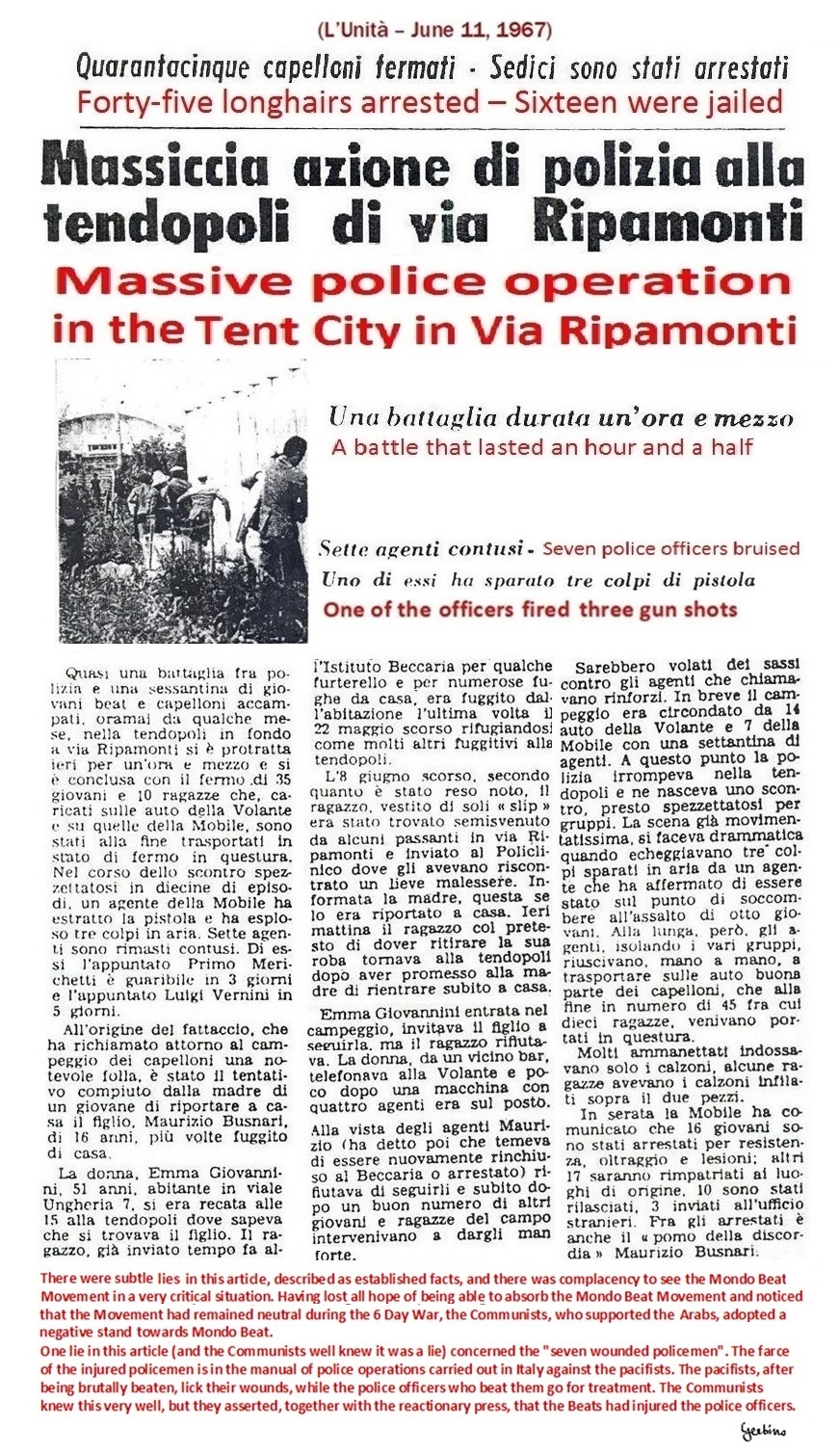
The military attack on Barbonia City described by L'Unità.
There were subtle lies described as facts in this article and there was complacency to see the Mondo Beat Movement in a very critical situation. Having lost all hope of being able to absorb the Movement and having noticed that the Movement remained neutral during the 6 Day War, the Communists, who supported the Arabs, took a negative instance towards Mondo Beat.
One lie in this article (and the communists knew well it was a lie) was about the "seven policemen injured". The farce of the injured policemen is in the manual of police operations carried out in Italy against pacifists. The pacifists, after being brutally beaten, lick their wounds, while the policemen who beat them go to seek treatment. The Communists knew this very well, but L'Unità. claimed, along with the reactionary press, that the Beats had injured the police.
(La Notte, June 11, 1967)
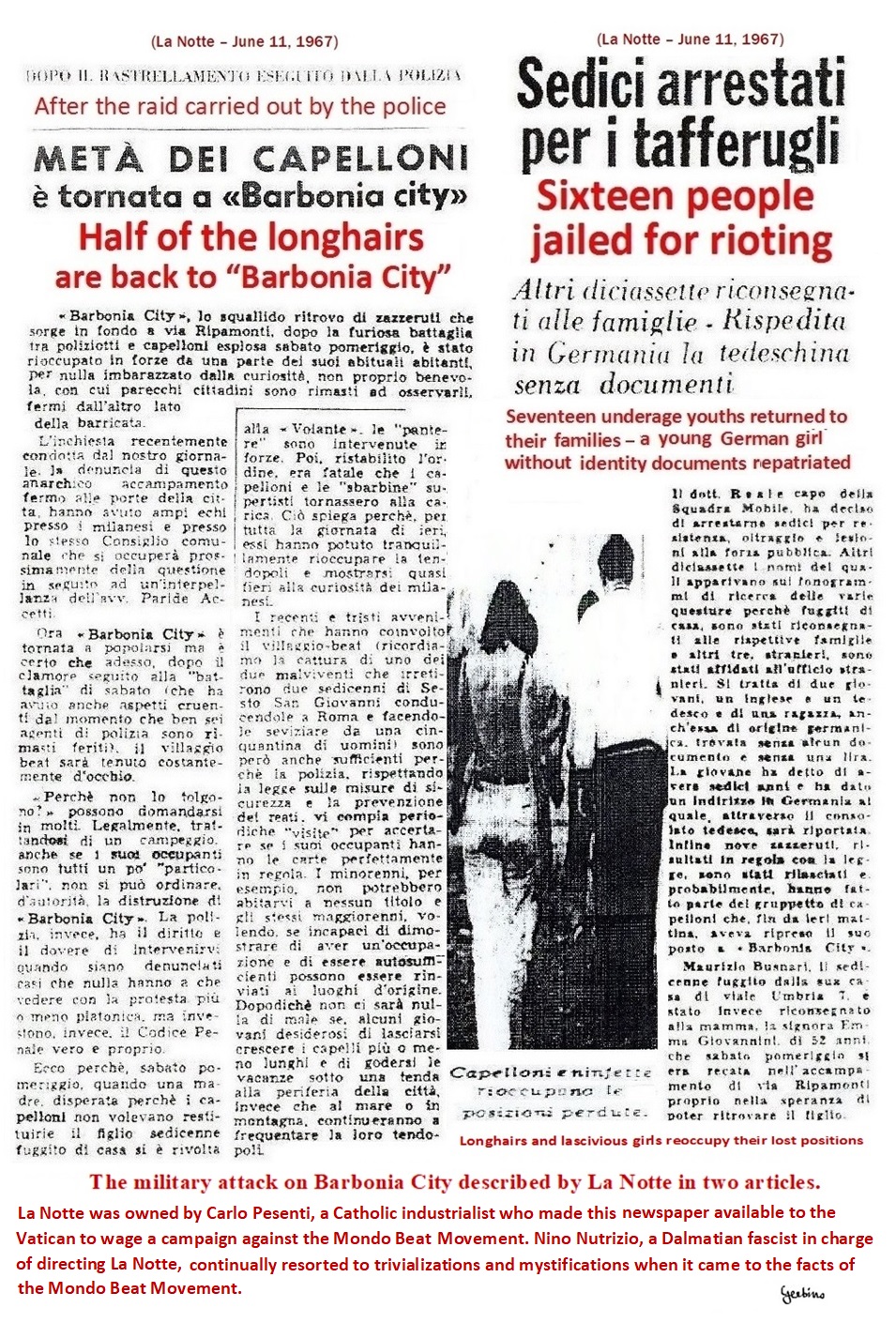
The military attack on Barbonia City described by La Notte in two articles.
There were many lies in these two articles, aimed at discrediting the youth of the Mondo Beat Movement.
La Notte was owned by Carlo Pesenti, a Catholic industrialist who made this newspaper available to the Vatican to wage a campaign against the Mondo Beat Movement. Nino Nutrizio, a Dalmatian fascist in charge of La Notte, continually resorted to trivializations and mystifications when it came to the Mondo Beat Movement.
--------
Now let's continue with the reconstruction of the events and focus on what happened on June 11.
On that morning Giuseppe Pinelli arrived in Barbonia City with a friend who had a large car, to pick up Melchiorre Gerbino and go with him to the Cave to collect the material to be saved by transferring it to the Sacco and Vanzetti section. On this occasion Melchiorre Gerbino told Giuseppe Pinelli about the bluff he had planned, aimed at provoking a massive military intervention in Milan.
Giuseppe Pinelli, who had predicted, like Gerbino, that Mondo Beat's structures would soon be destroyed, agreed that the best thing to do was to prolong the military action against Mondo Beat as much as possible and appreciated the bluff devised by Melchiorre Gerbino.
Thus, for the success of the bluff, Melchiorre Gerbino asked Giuseppe Pinelli to issue imaginative press releases on the imminent arrival in Milan of Beats and Provos coming from all over Italy and abroad. It was important that these imaginative press releases originated from the Sacco e Vanzetti section, to be credible, because this was a serious organization, which in the past had been frequented by characters who had participated in the Spanish Civil War and in the Italian Resistance and, at present, was frequented by the Milanese Provos. Giuseppe Pinelli, who was the trustee of that section, promised Melchiorre Gerbino that he would prepare imaginative press releases on Beats and Provos moving from all over towards Milan and that he would send them to the main newspapers.
While recovering the material to save, Giuseppe Pinelli and Melchiorre Gerbino also collected thousands of copies of the last issue of Mondo Beat magazine, to take them from the Cave to Barbonia City. Those were the copies of whom Gerbino had stopped the sale on the streets, to have them distributed over time, but now it was urgent to get rid of them. And back in Barbonia City, Melchiorre Gerbino gathered youths who wanted to distribute these copies outside of Milan and gave each a hundred copies for free. Thus, he got rid of thousands of copies of the magazine and sent many youths away, so that neither the youths nor the copies would end up in the upcoming military raid. Finally, he distributed copies of the leaflet of the Gathering of all Beats and Provos and made sure that a copy ended up in the hands of a police informant who surely would have rushed to the Police Headquarters to deliver it. Of this informant we have already said something. He was
Antonio Sottosanti, nicknamed Nino il Fascista .
As we talk about Nino the Fascist, let's explain why we have let him frequent Mondo Beat facilities, although we were aware he was a police informant. We did it because Mondo Beat welcomed in its structures anyone who respected the rules of no drugs, no violence, no theft. Being this the situation, the Police Headquarters was able to infiltrate Mondo Beat at will, so it was smarter to know who the police informants were, rather than not. Why this? Because, observing their behavior, we would have had perception of the state of tension that, in a given moment, the Police Headquarters had towards Mondo Beat, say, if they were preparing an attack or were relaxed. And, exceptionally, we could have used police informants to bluff, like Melchiorre Gerbino did with Nino the Fascist, when Melchiorre Gerbino made sure that Nino the Fascist got hold of a leaflet from the Gathering of all the Beats and Provos, since surely Nino the Fascist would have rushed to the Police Headquarters to deliver that leaflet and this was what Melchiorre Gerbino wanted Nino the Fascist to do.
And indeed the Corriere della Sera came out with a special edition a few hours after Nino the Fascist had been in possession of that leaflet. Corriere della Sera published special editions very seldom. And this special edition, distributed in Milan and in the suburbs in the afternoon, was similar to the normal edition which had appeared in the morning, but in the article on Barbonia City there was one more detail, that of the Gathering of all Beats and Provos.
Thus, after being in possession of the leaflet, Nino the Fascist had rushed to the Police Headquarters to deliver it and the Police Headquarters had communicated the news to Corriere della Sera, which in turn decided to publish a special edition. Corriere della Sera, "the most authoritative Italian newspaper", as it liked to define itself, would not have proved to be also the best informed!?

Corriere della Sera - Special edition - June 11, 1967.
This special edition made Melchiorre Gerbino experience some of the most euphoric moments in his life (but very intimately, given the circumstances). Since at the Corriere della Sera they had taken for granted that the Gathering of all Beats and Provos would happen, it was not insane to hope that the Vatican would order the Italian government to protect Milan militarily.
Now, some comments on this article:
1) As it was impossible to tell that Nino the Fascist provided the flyer of the Gathering of all Beats and Provos, Corriere della Sera fabricated the news that the flyer had been seized by the police in a tent in Barbonia City used as press office (but such a tent did not exist in Barbonia City).
2) There is written that a police officer had to shoot in the air to protect himself. In reality, 3 shots were fired near Melchiorre Gerbino's tent at the beginning of the police operation, as this was the signal for the secret agent, disguised as a journalist, who was interviewing Gerbino, to get out of the tent and drag away the tarp "Good people, Corriere della Sera tells you bullshit", an operation which a uniformed policeman could not do.
3) Adriano Carminati, the fascist activist who was described by the Corriere della Sera as the cook in Barbonia City, who had arrived there with a large gas cylinder, had the task to blow up the gas cylinder when the police would have invaded the campsite. And indeed Adriano Carminati kept the gas cylinder up in the air, close to a fire he had prepared, threatening to let it explode if the police did not leave the camp, conforming the instructions he had received by the secret services. But Adriano Carminati would have avoided blowing up the gas cylinder. And after the destruction of Barbonia City, in which he did not take part, he wanted Melchiorre Gerbino to know that he was sorry for the destruction, because he had loved the time he had spent in the campsite. Yes, Adriano Carminati was, and would have remained, a fascist, but with a touch of Beat fair play.
The destruction of Barbonia City. Milan, June 12, 1967.
The destruction of Barbonia City was ordered by the deputy prosecutor
Adolfo Veltri.
It was carried out by policemen, carabinieri, employees of the health office, a day and a half after the secret service agents, disguised as fathers of family, had failed in the task of setting fire to the tents.
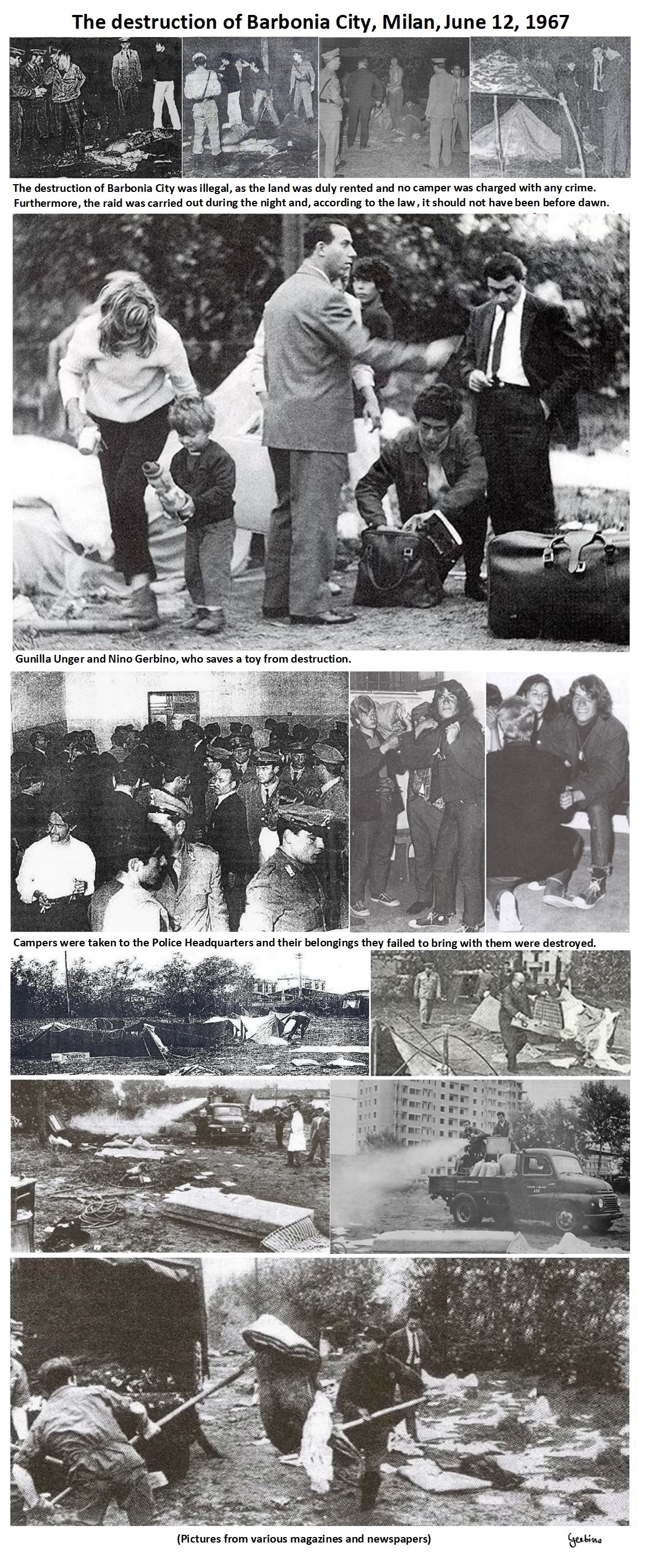
Pictures of the destruction of Barbonia City from various publications.
When the military invaded the campsite, there were only 54 people, among them many were secret agents and police informants. The hundreds of youths who frequented Barbonia City, as they were aware that there was going to be a raid, had drifted away.
Some articles on the destruction of Barbonia City.
Many have written about the destruction of Barbonia City, from Salvatore Quasimodo, Nobel Prize for Literature, to the Berkley Barb.
Here we reproduce four articles of the Italian reactionary press, which would have contributed to provoke the mass contestation, due to their unbearable hypocrisy.
(La Notte, June 12, 1967)
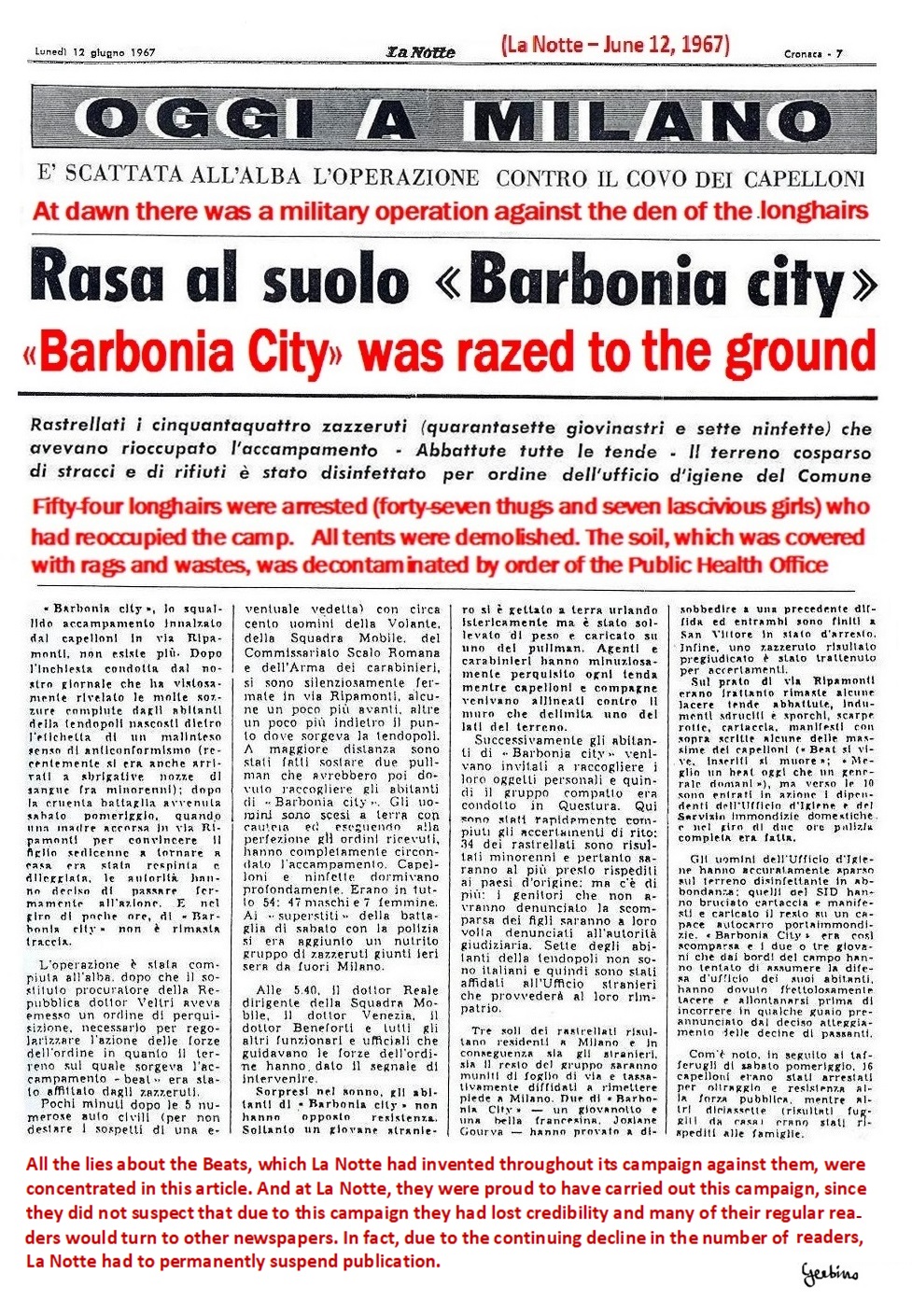
Description of the destruction of Barbonia City by La Notte.
All the lies about the Beats, which La Notte had invented throughout its campaign against them, were concentrated in this article. And at La Notte, they were proud to have carried out this campaign, since they did not suspect that due to this campaign they had lost credibility and many of their regular readers would turn to other newspapers. In fact, due to the continuing decline in the number of readers, La Notte had to permanently suspend publication.
(Corriere d'informazione, June 12-13, 1967)
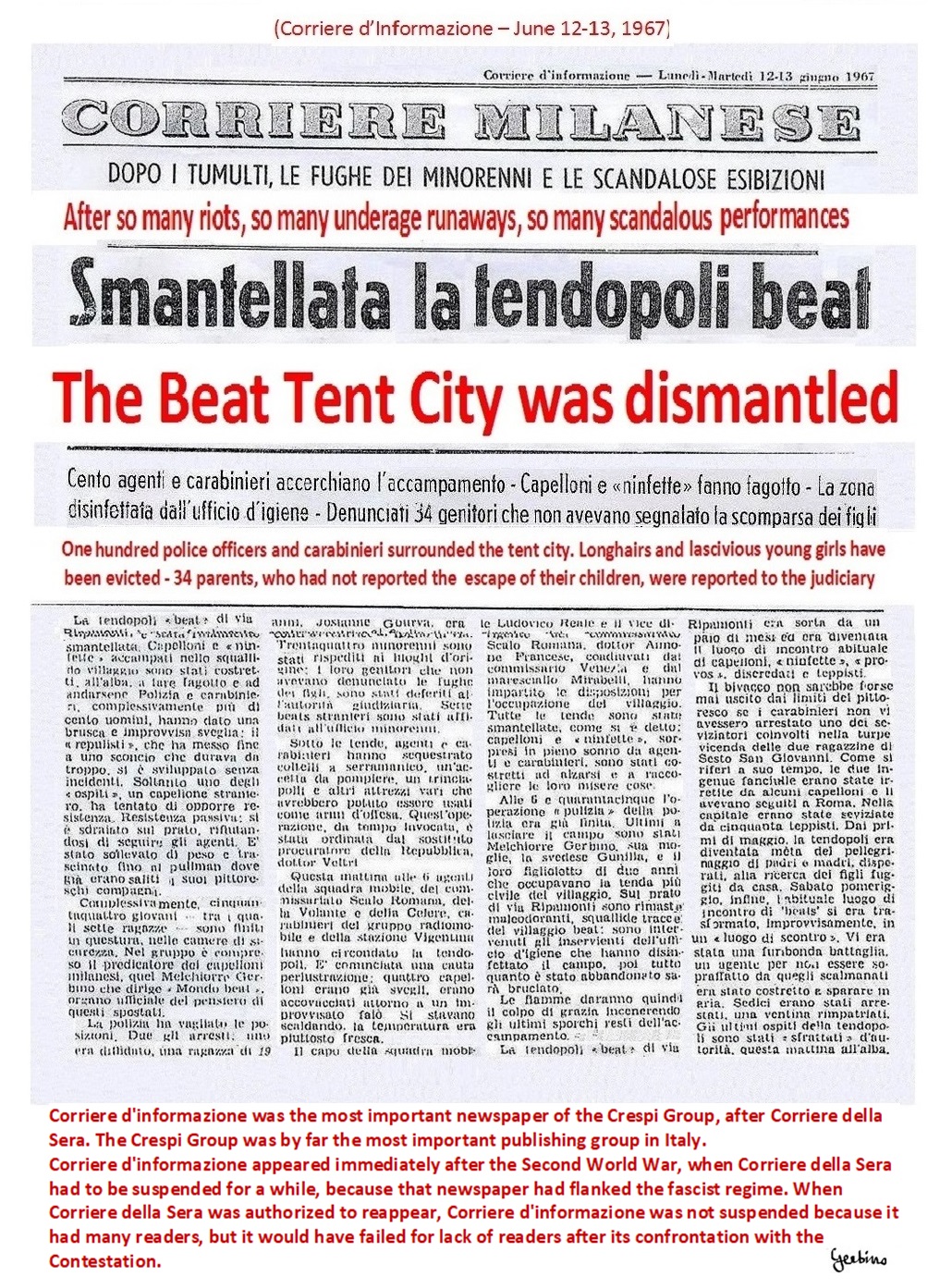
Description of the destruction of Barbonia City by the Corriere d'informazione.
Corriere d'informazione was the most important newspaper of the Crespi Group, after Corriere della Sera. The Crespi Group was by far the most important publishing group in Italy.
Corriere d'informazione appeared immediately after the Second World War, when Corriere della Sera had to be suspended for a while, because that newspaper had flanked the fascist regime. When Corriere della Sera was authorized to reappear, Corriere d'informazione was not suspended because it had many readers, but it would have failed for lack of readers after its confrontation with the Contestation.
(A magazine of the Crespi Group - mid-June 1967)
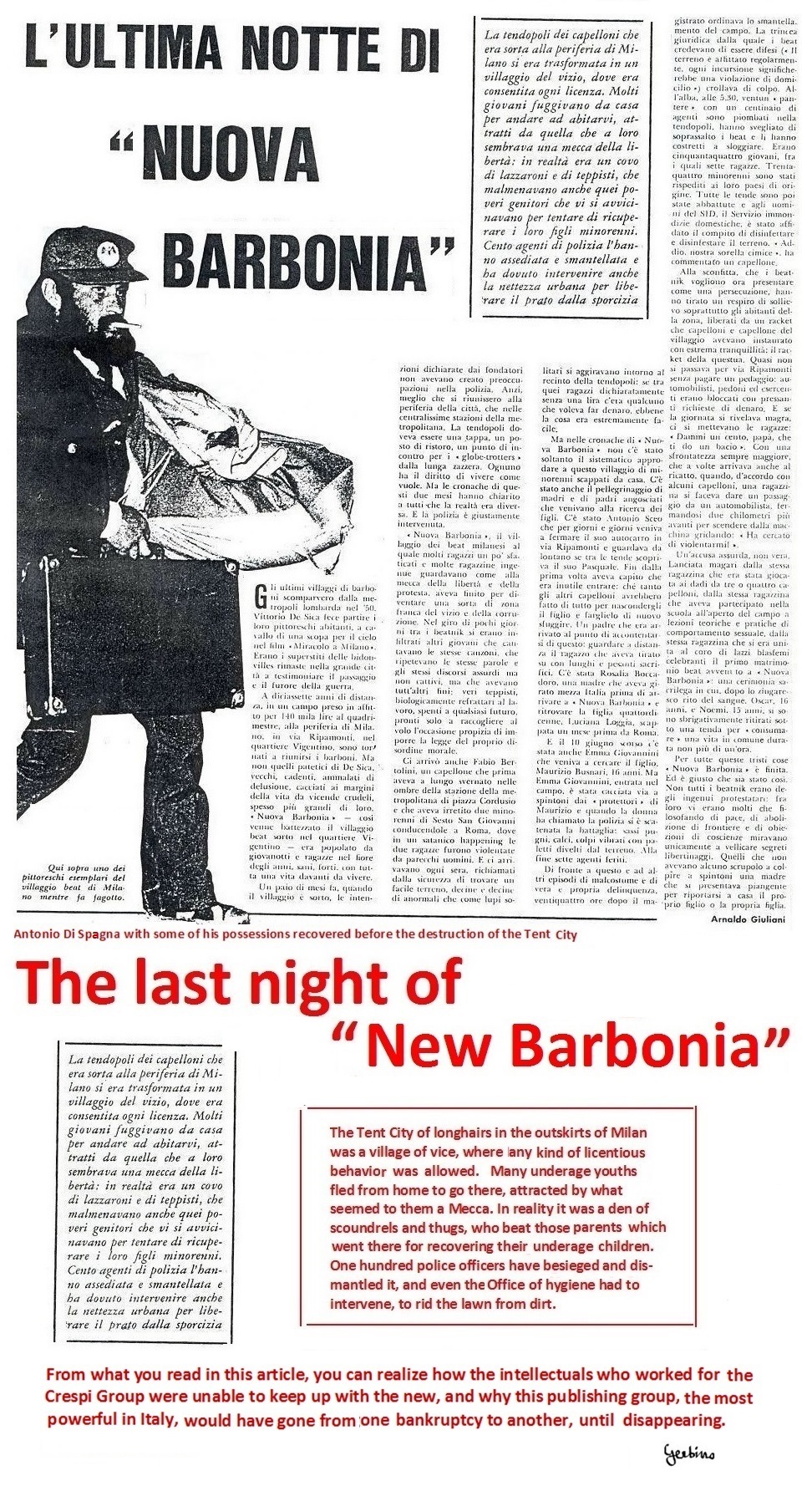
Description of the destruction of Barbonia City by a magazine of the Crespi Group.
In this article, we read: "The tent city of the longhairs in the outskirts of Milan was a village of vice, where any kind of licentious behavior was allowed. Many underage youths fled from home to go there, attracted by what seemed to them a Mecca.
In reality, it was a den of scoundrels and thugs, who beat those parents who went there for recovering their underage children.
One hundred police officers have besieged and dismantled it, and even the Office of hygiene had to intervene, to rid the lawn from dirt".
From this description it can be understood how the intellectuals who worked for the Crespi Group were unable to keep up with the new, and why this group went from one failure to another, up to the extinction.
(In the photo, Antonio Di Spagna with some of his belongings recovered before the destruction of Barbonia City).
(Corriere della Sera, June 13, 1967)

Description of the destruction of Barbonia City by the Corriere della Sera.
It is disconcerting to recall the blind campaign of Corriere della Sera against the Mondo Beat Movement, or rather, against the renewal of Italian society. Corriere della Serra would have ignored the influence Mondo Beat exerted on the world of music, fashion, literature. It would have ignored how Italian women had begun emancipating themselves thanks to what Mondo Beat had promoted and how a new socio-political reality had concretized, because young people of all social classes fraternized, when, before, the class struggle had marked Italian society. This new situation would have meant a historic change, because there would no longer have been confrontation between ideologies, but between programs. Given that the system of the Western world democracies was the most progressive, it would no longer have been about changing it for another, but about how to make it more responsive, by affirming civil rights, taking care of the environment, nutrition, sexual life...
Almost all the characters of the old Italian intelligentsia, many of them linked to Corriere della Sera, were not prepared to enter this new era, they didn't even understand what was happening.
Returning to the chronological reconstruction of the facts, on June 12, the destruction of Barbonia City was carried out by the military, as we have seen in pictures and read in articles.
Around noon of that day, the destruction was completed and the campers, who had been detained at the Police Headquarters, were released. Shortly after, Melchiorre Gerbino accompanied Gunilla Unger and little Nino to the central station for a train to Stockholm.
In the afternoon, Melchiorre Gerbino met Giuseppe Pinelli and Antonio Di Spagna, with whom he had to coordinate for the bluff of the Gathering of all Beats and Provos. Obviously, they did not expect Beats and Provos to come to Milan, because, when they had asked for this, they hadn’t distributed flyers, but sent messengers to well-known Beats in the cities where Mondo Beat's youths were numerous. Thus, the bluff would have consisted of making journalists believe that thousands of Beats and Provos were expected in Milan and many were already heading there.
For the success of the bluff, Antonio Di Spagna had taken on him the task to alarm the Police Headquarters, say, have them to believe that the Movement was in full eruption. So, he would have provoked tensions in Piazza Duomo, where youths who had been evicted from Barbonia City would camp in front of the Cathedral.
Furthermore, Antonio Di Spagna formed squads of kamikazes, that is, young people who spectacularly invaded the Barbonia City camp, forcing the soldiers who manned it to run across the lawn to capture them. It was then that also some office employees, in suits, would have invaded the field, to live a moment of fame, illuminated by the flashes of the photojournalists.
At night, while the soldiers were in the barracks, Antonio Di Spagna would symbolically reoccupy the camp of Barbonia City, together with many youths who gathered there.
Antonio Di Spagna, a true hero of the Contestation.
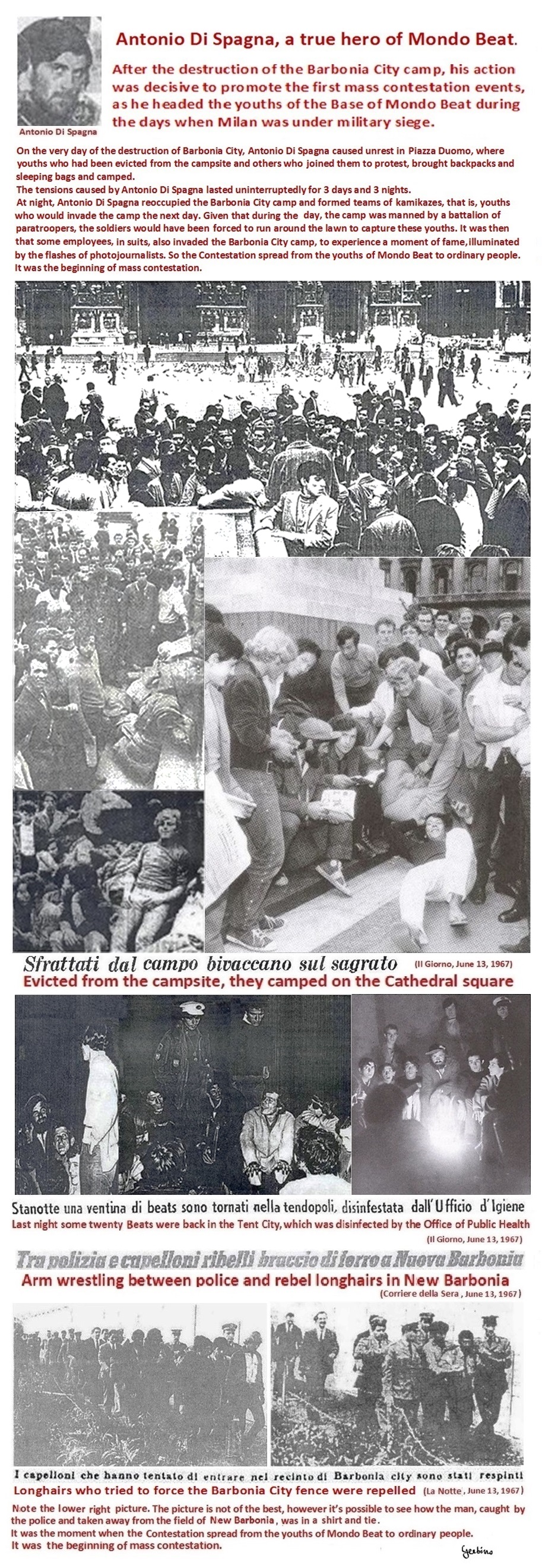
Antonio Di Spagna headed the Contestation during the crucial days which followed the destruction of Barbonia City.
While Antonio Di Spagna headed the youths of the Base of Mondo Beat, Melchiorre Gerbino gave interviews. To the question, asked by each journalist, what would be the turn of events, Gerbino replied that fifty thousand youths were expected to arrive in Milan. He didn't talk about this with enthusiasm, but as if he was distracted by other thoughts. Because of the credibility that the Mondo Beat Movement had proved during its difficult path, journalists would have believed that Milan would be invaded by a mass of contestators.
Meanwhile, Giuseppe Pinelli sent press releases to newspapers, announcing the arrival in Milan of Beats and Provos. As these press releases originated from the anarchist section Sacco e Vanzetti, the newspapers have published excerpts from them. In these press releases, Giuseppe Pinelli described Beats and Provos moving towards Milan, first from various Italian cities, then from a geographical arc which extended from Palermo to London.
(La Notte, June 13, 1967)
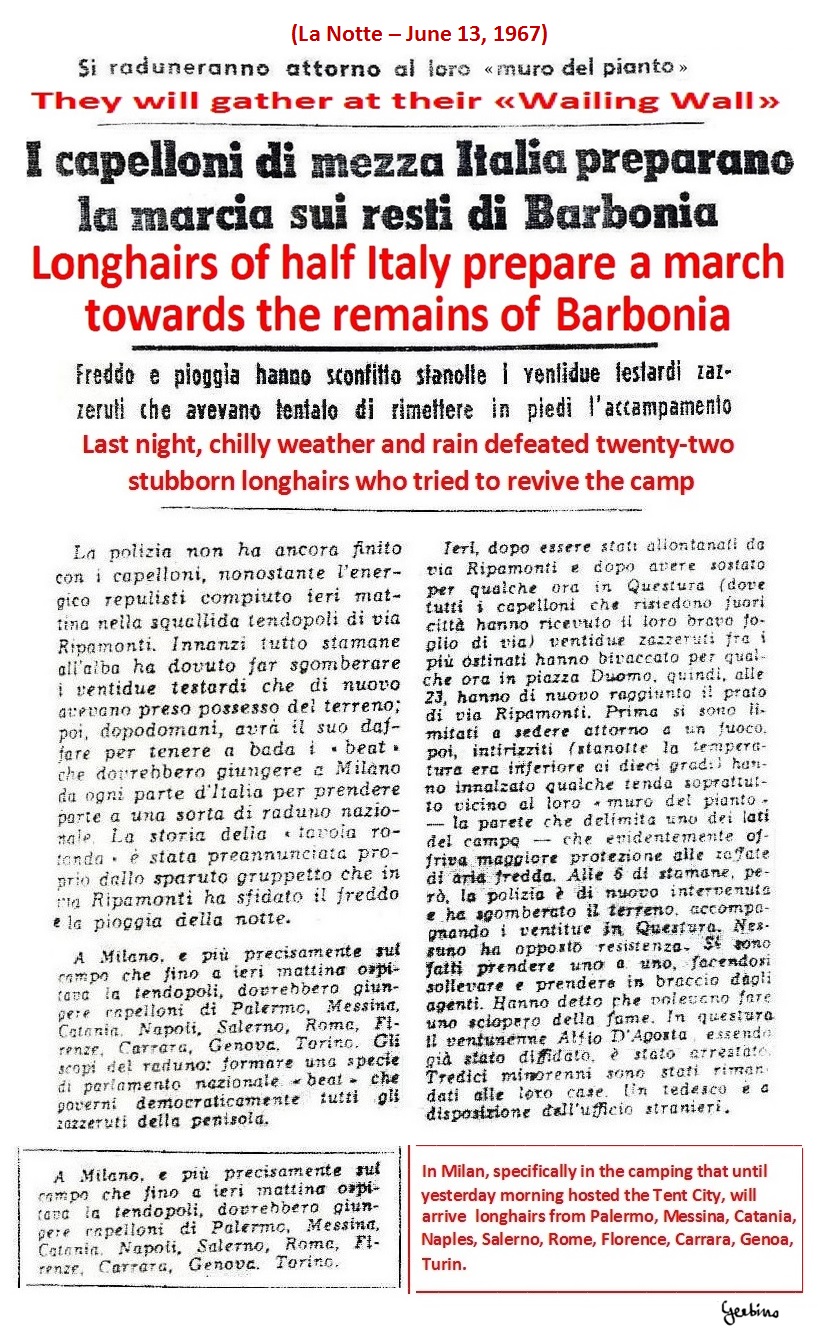
La Notte about the arrival of Beats and Provos in Milan.
La Notte: "They will gather at their Wailing Wall. Longhairs from half Italy prepare a march towards the remains of Barbonia".
With some concern, La Notte published an extract from a press release by Giuseppe Pinelli, where it was described how Beats and Provos were arriving to Milan from Palermo, Catania, Messina, Naples, Salerno, Rome, Florence, Carrara, Genoa, Turin, to reoccupy Barbonia City lawn.
(Corriere della Sera, June 14, 1967)
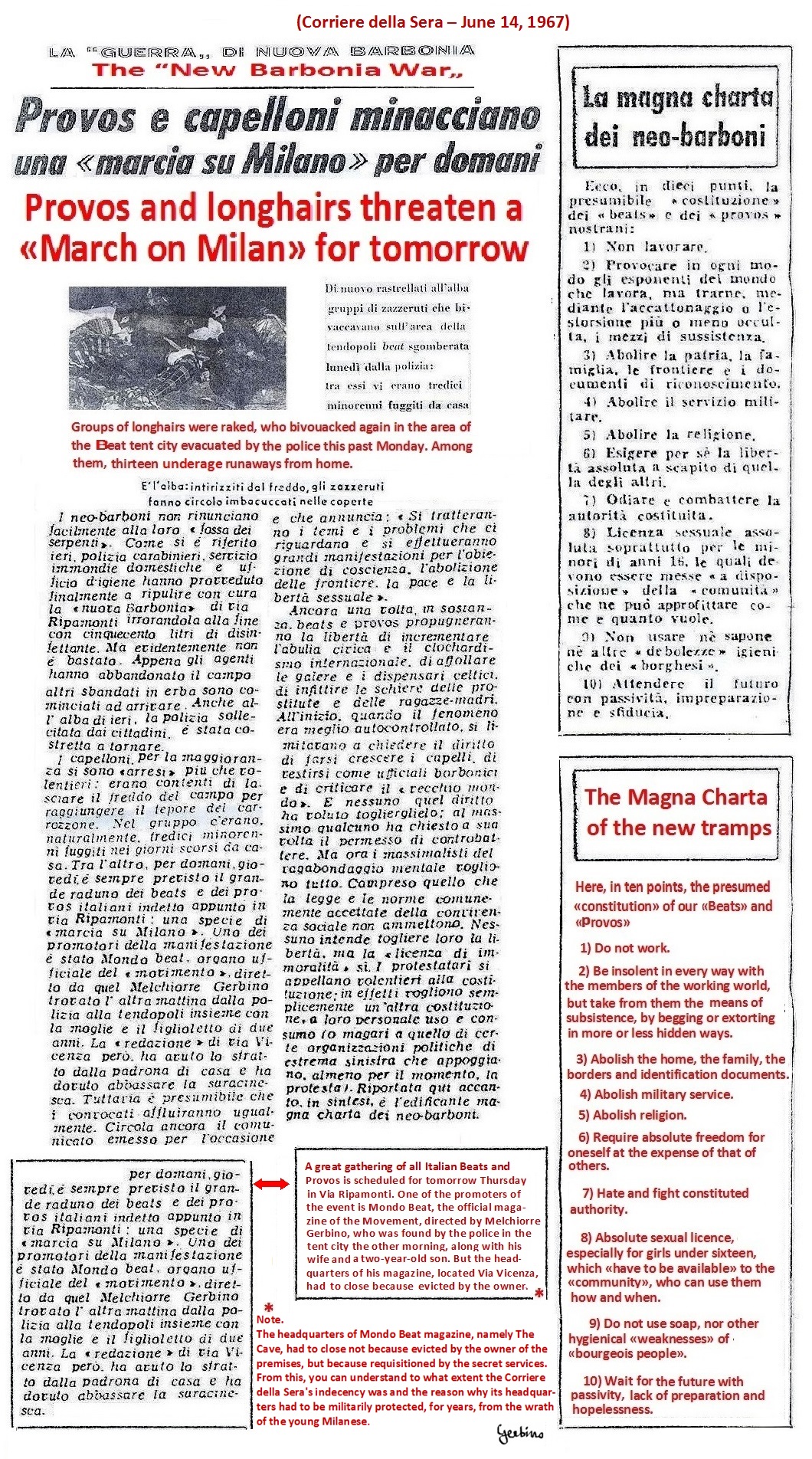
Corriere della Sera on the arrival of Beats and Provos in Milan.
In addition to the usual sentences of contempt for the Beats (see above The Magna Charta of the new tramps), in this article is written: "A great gathering of all Italian Beats and Provos is planned for tomorrow, Thursday, in Via Ripamonti. Among the promoters of the event is Mondo Beat, the official magazine of the Movement, directed by Melchiorre Gerbino, who was found the other morning by the police in the tent city, together with his wife and a two-year-old son. But the headquarters of his magazine, located via Vicenza, had to close because evicted by the owner".
But, in reality, the headquarters of Mondo Beat magazine, namely the Cave, had to close not because evicted by the owner of the premises, but because requisitioned by the secret services. From this you can understand to what extent the indecency of Corriere della Sera was and the reason why its headquarters had to be militarily protected from the wrath of young Milanese.
But, at this point, what mattered was that, since Corriere della Sera believed that a mass of Beats and Provos would invade Milan, everyone would have believed the same. And in fact, in the Vatican too they would have believed this, and they would have ordered Prime Minister Aldo Moro to mobilize the military to protect the city.
Yes, the bluff had succeeded!
(Il Giorno, June 14, 1967)
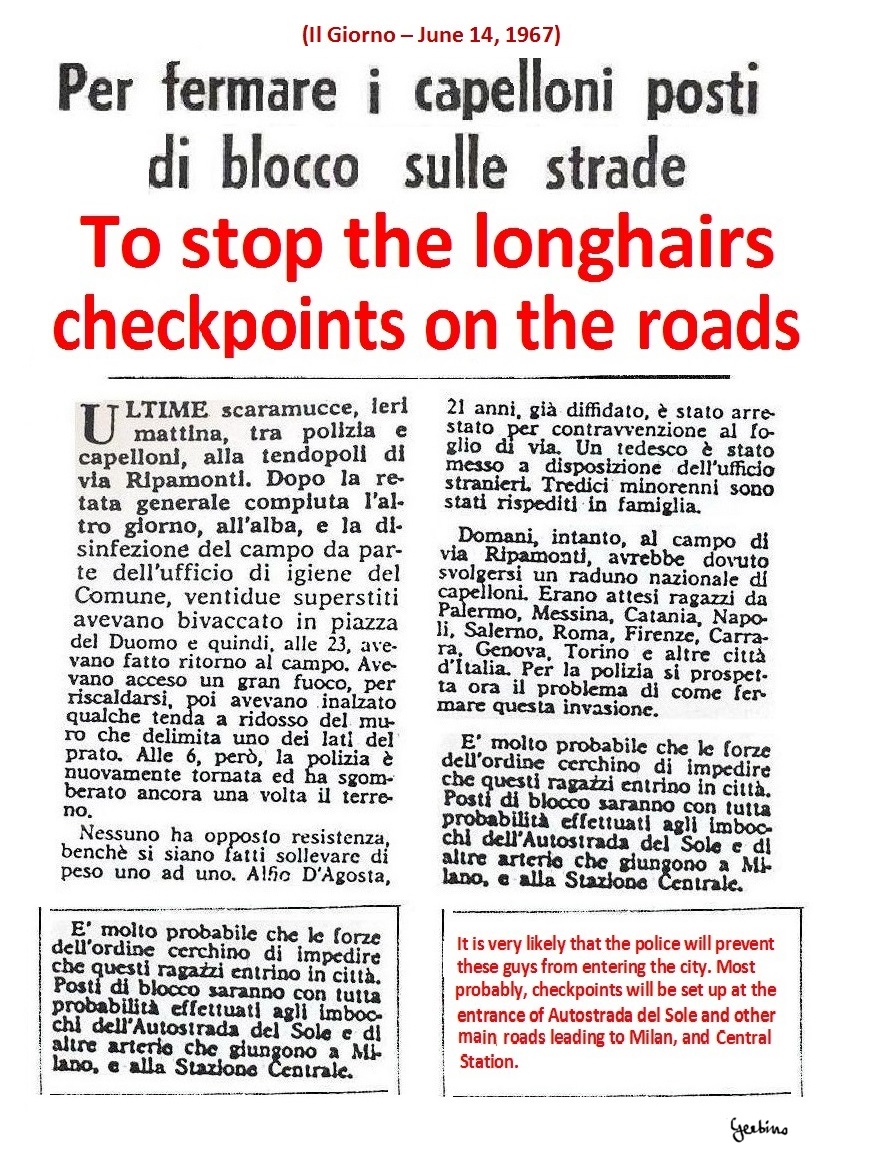
Il Giorno about the arrival of Beats and Provos in Milan.
"To stop the longhairs, checkpoints on the roads." - Description by il Giorno of the police measures to contain the arrival of Beats and Provos - "It is very likely that the police will prevent these guys from entering the city. Checkpoints will be set up at the entrance of Autostrada del Sole and other main roads leading to Milan and at the Central Station."
(La Notte, June 14, 1967)
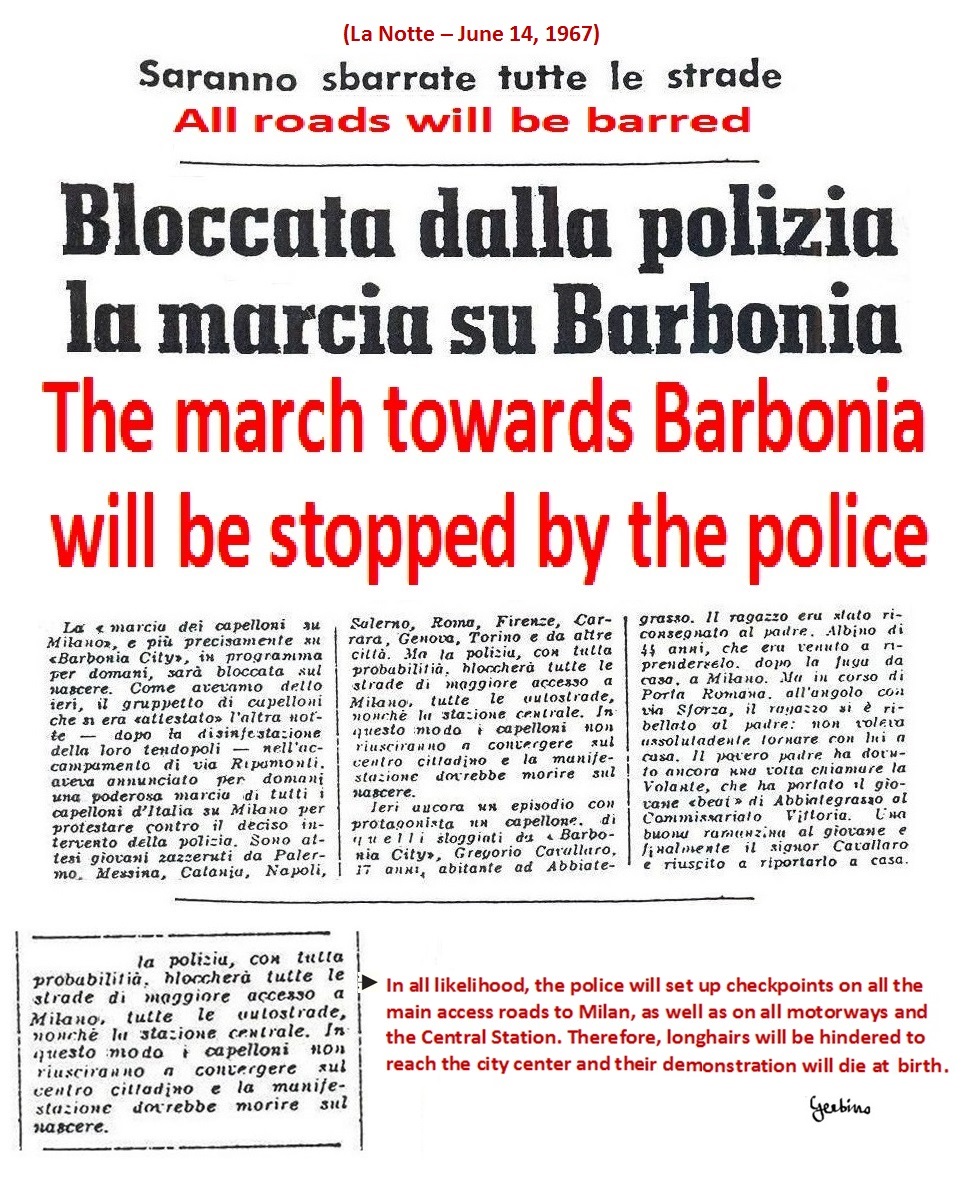
La Notte on police measures to prevent Beats and Provos from entering Milan.
La Notte "All roads will be barred. In all likelihood, the police will set up checkpoints on all the main access roads to Milan, as well as on all motorways and at the Central Station. Therefore, the longhairs will be hindered to reach the city center and their demonstration will die at birth".
(Il Giorno, June 15, 1967)
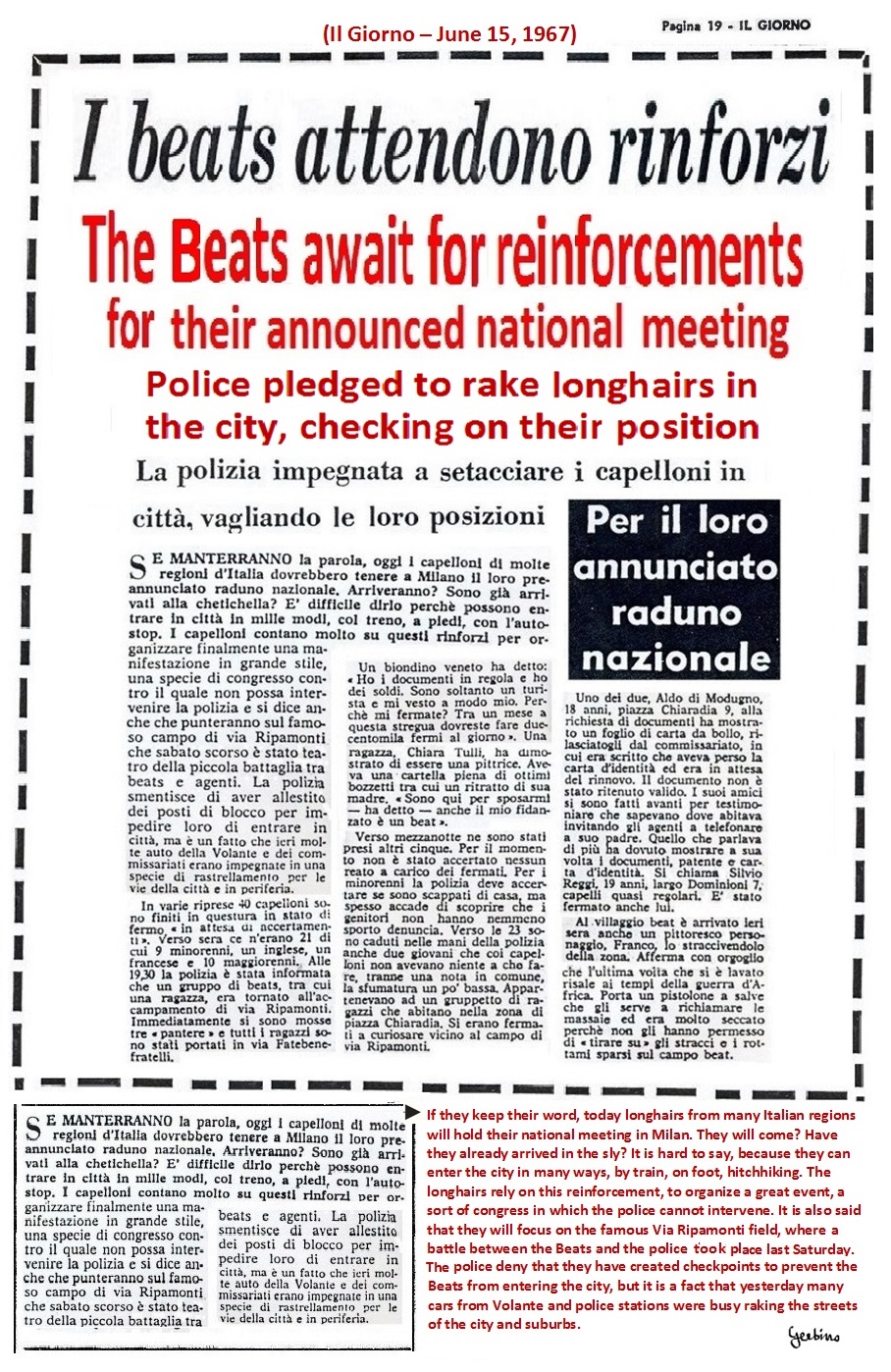
Il Giorno on the commitment of the police to rake the streets of Milan and suburbs.
Il Giorno. It reads "If they keep their word, the longhairs of many Italian regions will hold their national meeting today in Milan. Will they come? Have they already arrived on the sly? It's hard to say, because they can enter the city in many ways, by train, on foot, by hitchhiking. The longhairs rely on this reinforcement to organize a big event, a kind of congress in which the police cannot intervene. It is also said that they will focus on the famous field in Via Ripamonti, where a battle between Beats and police took place last Saturday. Police deny that they have created checkpoints to prevent the Beats from entering the city, but it is a fact that yesterday many cars from Volante and others police stations were busy raking the streets of the city and those of the suburbs."
In fact, the police were catching common youngsters who were mistaken for Beats as they had slightly long hair because they followed the fashion. Police also captured six dancers from the Lola Falana Ballet, who, mistaken for Beats, were beaten and imprisoned (but Lola eventually freed them).
(La Notte, June 15, 1967)
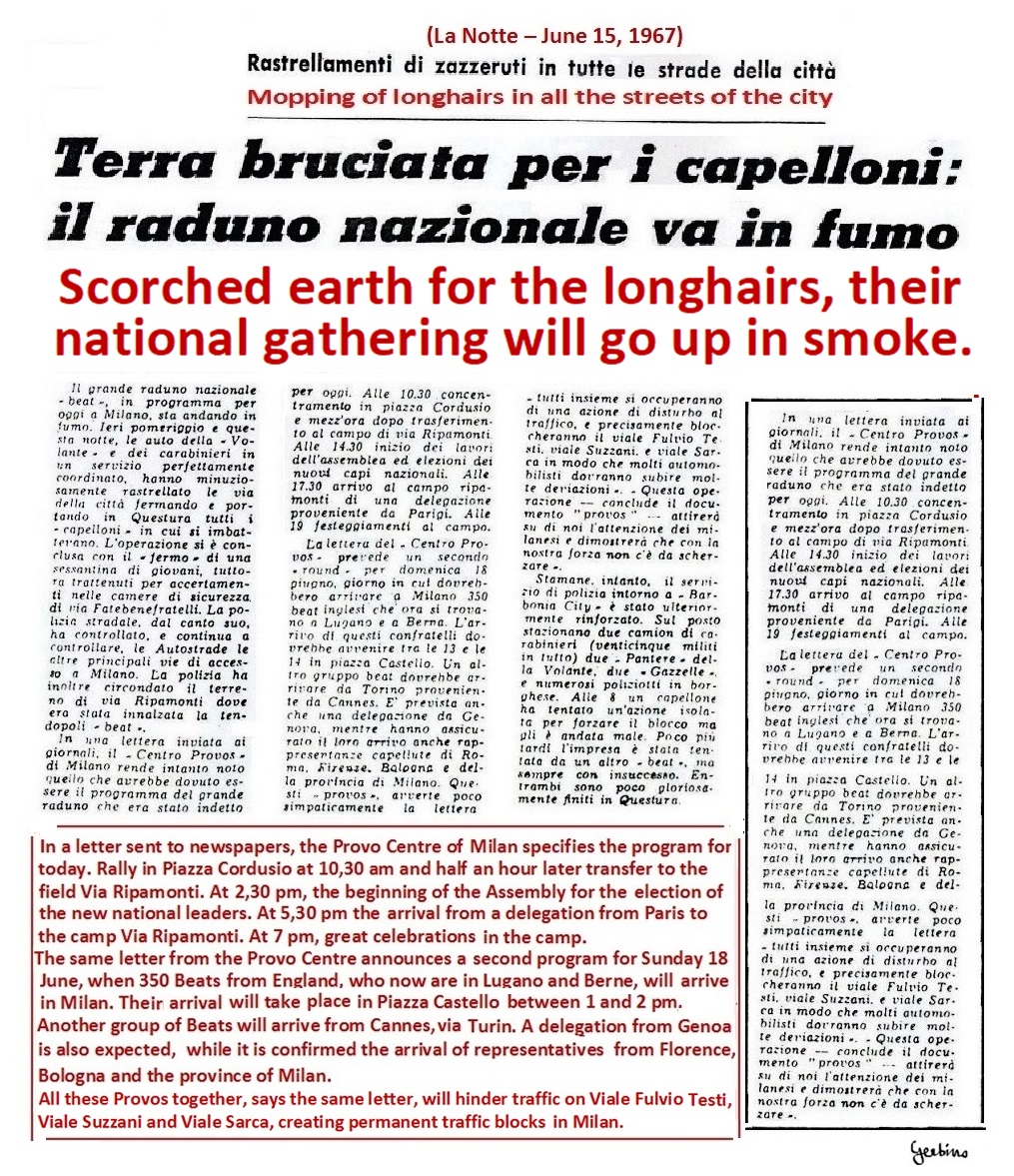
La Notte. Milan under military control.
With a last press release, Giuseppe Pinelli tried to keep the soldiers mobilized for another 3 days, until June18. Here an extract of this press release, published by La Notte:
"In a letter sent to newspapers, the Provo Centre of Milan specifies the program for June 15.
Rally in Piazza Cordusio at 10,30 am and half an hour later transfer to the field Via Ripamonti.
At 2,30 pm, the beginning of the Assembly for the election of new national leaders.
At 5,30 pm the arrival from a delegation from Paris to the camp Via Ripamonti.
At 7 pm, great celebrations in the camp.
The same letter from the Provo Centre announces a second program for Sunday, June 18, when 350 Beats from England, who are now in Lugano and Berne, will arrive in Milan. Another group of Beats will arrive from Cannes, via Turin. A delegation from Genoa is also expected, while it is confirmed the arrival of representatives from Florence, Bologna and the province of Milan. All these Provos together, says the same letter, will hinder traffic in Viale Fulvio Testi, Viale Suzzani and Viale Sarca, creating permanent traffic blocks."
For its part, La Notte reassured its readers on the efficiency of the Italian defensive system, announcing that Milan was under military control and the scorched earth would be made up of Beats and Provos.
And on June 15, the day of the beginning of the imaginary Gathering of all Beat and Provos, the largest Italian military operation since the end of Second World War, and the most ridiculous ever, would take place in Milan.
On all roads and highways leading to Milan, checkpoints had been set up at the intersection with the urban network.
The Central Station and the other half dozen railway stations in Milan were manned.
Two battalions of paratroopers had been deployed, one in Piazza Duomo, the other in Barbonia City lawn, while the army was alerted in the barracks.
Police and carabinieri cars ran at full blast sirens through the streets, where there was less traffic than usual, some people remaining at home, worried.
Meanwhile, the Beats, far from all this, enjoyed the June sea on the most fashionable Italian beaches.
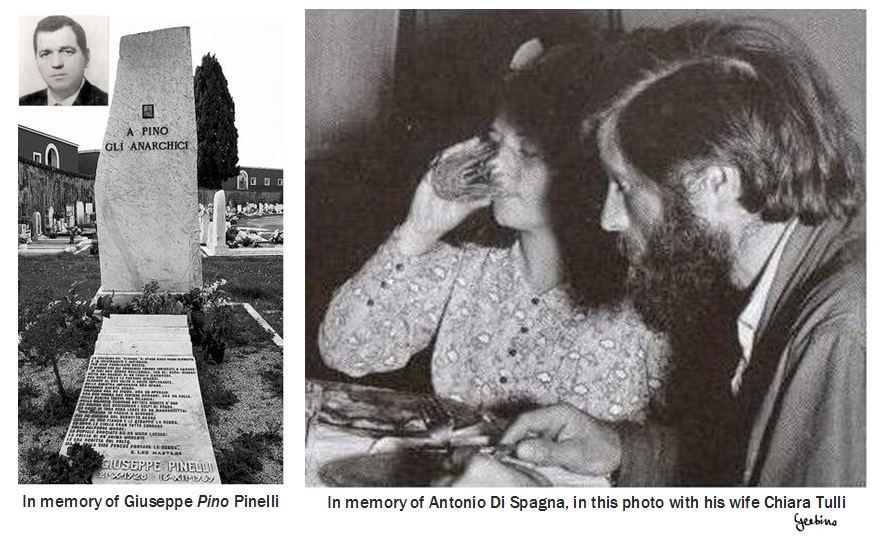
Melchiorre Gerbino in memory of Giuseppe Pinelli and Antonio Di Spagna.




















